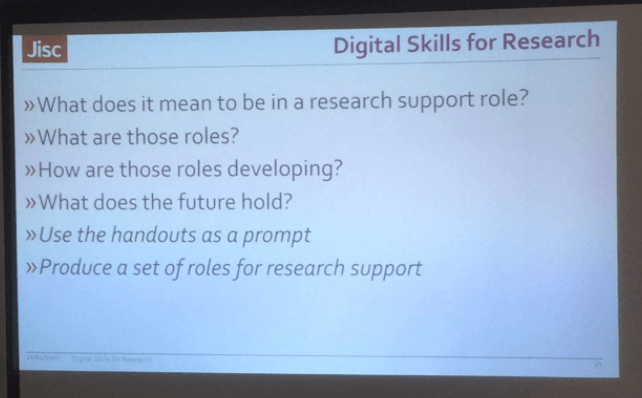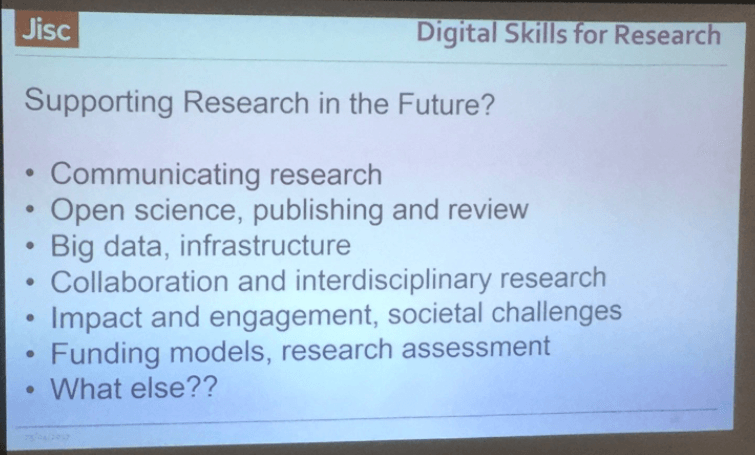On 25th April I was amongst a number of colleagues from a wide range of stakeholders and organisations invited by Jisc to a co-design workshop on ‘Digital Skills for Research’.
Co-design is Jisc’s “collaborative innovation model” by which they have engaged with the sector to identify 6 discrete challenges to explore and we were here today to think about next generation research environments.
Our first task was to brainstorm around research support roles which perhaps turned out to be rather more discursive than our hosts expected. Rather than a clearly defined list of discrete roles, a consensus began to emerge that associated skill sets are extremely fluid and that professional nomenclature, and institutional structure, can potentially have the effect of artificially limiting the scope of a role (it is perhaps instructive in this context to revisit the range of job titles posted to the UKCoRR mailing list in 2016, and, no doubt, the many similarities and differences of the associated job descriptions.)
This led on to a discussion about qualifications, training and appropriate professional accreditisation, which is certainly an issue for repositories and Open Access (also see related blog posts from Cambridge at the bottom of this post). A similar issue was also raised in the context of research software development.
ARMA’s Professional Development Framework is perhaps the obvious resource for research support skills and the Vitae Researcher Developer Framework (RDF) is a valuable resource for researchers and their support services alike and might highlight the increasingly collaborative relationship between researchers and support services – a theme that also emerged at a recent White Rose Libraries Digital Scholarship Event
We got back on track in the next exercise, considering the range of (digital) skills required by professionals working in research support roles, although it was observed that ‘skill’ doesn’t necessarily describe the sheer range of knowledge required, such as an overview of the myriad funder policies around open access and data management for example.
To consider bibliometrics as but one skill set that might often fall to a Librarian or other information professional in lieu of a trained bibliometrician (how many institutions have one of these exotic beasts?), there are myriad proprietary data sources covering both ‘traditional’ and ‘alternative’ metrics that we must be familiar with and which might help to inform impact assessment and yet there is no clear training offer, at least I’m not aware. The best resource I have found is MyRI, a collaborative project of three Irish academic libraries, freely available at http://myri.conul.ie/.
So, which organisations are responsible for fostering these myriad digital skills, now and in the future? The day’s final exercise identified the usual suspects – Jisc, ARMA, CILIP and of course our very own UKCoRR, though there is the ongoing question around our capacity as an unfunded, voluntary organisation and positioning in relation to other organisations. We hope to continue our consultation around the future vision and remit for UKCoRR (survey) at our members’ day at the University of Warwick on 7th July.
A useful lunchtime conversation with Helen Blanchett considered some sort of OA training provision and network support from Jisc, the discussion was obviously informal but we hope that Helen will be in Warwick for our members’ day to discuss the idea further.
If the landscape is complex now it will only become more so, with ever more specialist roles and associated skill sets and the final discussion was around the potential role for Jisc and by extension, for our own purposes, for UKCoRR:
Jisc’s provision currently comprises “144 guides and case studies”, as well as a number of face to face and online courses, both fee paying and free models, including their Digital leaders programme and the Digifest conference for example; one suggestion was that there is in fact a gap for a conference dedicated to cutting edge digital research practice, in view of the fact that Digifest2017 focused on teaching rather than research.
Skills development from @Jisc…a gap for a conference dedicated to cutting edge digital research practice suggests @Andy_Tattersall pic.twitter.com/FJMldxWAvJ
— Nick Sheppard (@mrnick) April 25, 2017
Related posts from University of Cambridge Office of Scholarly Communication:

